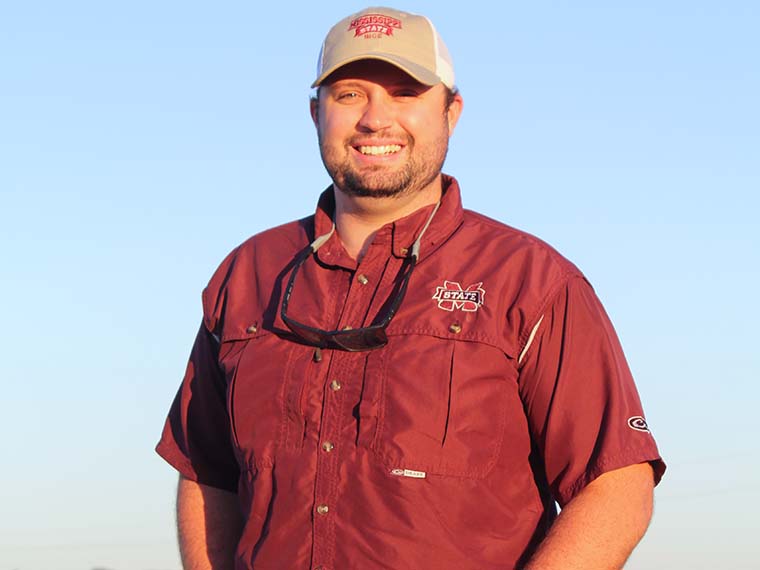The information presented on this page may be dated. It may refer to situations which have changed or people who are no longer affiliated with the university. It is archived as part of Mississippi State University's history.
For Cleveland, Mississippi native, Tayden Burrell, agriculture has always been a huge part of his life. Burrell grew up in the Mississippi Delta-a region nestled between the Mississippi and Yazoo Rivers and known for its rich agricultural economy; and has been around farms since he could remember. While his family does not farm, Burrell has worked on plenty of farms in this region and his love for agriculture has grown.
During his senior year of high school, Burrell began working for an agricultural retail company in the area. Through his work, Burrell's passion for agriculture began to grow-leading him to transfer from Mississippi Delta Community College to Mississippi State University during his junior year. Burrell received his bachelor's degree in agronomy, with a concentration in integrated crop management. He is currently working toward a master's degree in weed science in the Department of Plant and Soil Sciences.
"I love having a deeper understanding of agriculture," Burrell said. "When I learned that I could continue my studies and ultimately put together more pieces of the puzzle for producers, it sounded like something that made sense for me to do."
Under the guidance of Dr. Jason Bond, MAFES scientist and extension and research professor in plant and soil sciences at the Delta Research and Extension Center, Burrell's studies involve the control of problematic weeds primarily in the Delta. As part of his graduate thesis, Burrell is focusing on controlling Italian ryegrass populations in rice production.
"I'm trying to find a herbicide that will control Italian ryegrass with an application in the fall and that won't affect the rice stand in the spring," Burrell said. "It's gotten harder to control over the years, but the most economical way to control that weed is through fall-applied herbicides."
Glyphosate, commonly known by its commercial name of Roundup, is a phosphonic acid used to combat various types of weeds. During burndown, however, Italian ryegrass has become a common nuisance for many farmers in the Delta due to its resistance to this herbicide.
Burrell's research hopes to combat this issue by finding a new type of herbicide that can combat the prevalent Italian ryegrass populations during rice cultivation. Along with Dr. Bond, research associates and doctoral students, Alex Mangialardi and Will Eubank, Burrell plans to explore how more types of herbicides with different modes of actions can control this weed.
Specifically, he is evaluating group 15 herbicides which are shoot-growth inhibitors that are applied directly during soil preparation to prevent the emergence of weeds. These types of herbicides act at the very-long-chain fatty acid location of the weed's cell membrane and are prevalent in the agricultural industry.
"The industry is leaning toward these group 15 herbicides. The problem is some of those herbicides will impede rice growth and stand. So, you have to be careful with what you put out," Burrell said.
Different types of herbicides have already been tested during Burrell's research, mainly Valor and Outlook. Valor, which Burrell hoped would control Italian ryegrass, did not perform as well as intended. However, Outlook performed better than intended.
While he's unsure if he will pursue a doctorate or another degree, he hopes to stay in the agricultural field. Ultimately, he wants a career that lets him interact with people and help improve the quality of life for farmers.
"They say you don't work a day in your life if you find something you love to do, and I feel like I've found my lane," Burrell said.
This research is funded, in part, by the Rice Promotion Board.

